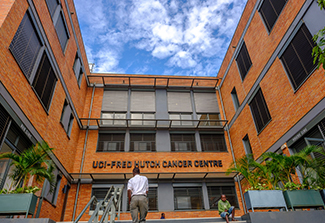US-Uganda collaboration examines how viral infection affects breast cancer
March/April 2025 | Volume 24 Number 2
 Photo courtesy of Manoj MenonDr. Manoj Menon
Photo courtesy of Manoj MenonDr. Manoj Menon
A collaboration between Fred Hutch Cancer Center in Seattle, Washington, and the Uganda Cancer Institute in Kampala aims to understand how HIV (and related immune system effects) influences breast cancer tumors in women living with HIV. The Fogarty-supported project is also likely to help patients in both countries, says Manoj Menon, MD, MPH.
“We will obtain important information regarding the pathogenesis of breast cancer among women living with HIV that will hopefully not just improve our understanding for patients in Uganda, but globally,” says Menon, principal investigator and associate professor, Fred Hutch and University of Washington School of Medicine.
Does HIV foster tumor growth?
Menon, an oncologist and hematologist, worked on an earlier project in Uganda that studied breast cancer, the most common type of malignancy in sub-Saharan Africa. “Although breast cancer is not considered an HIV-associated malignancy, we noticed that, in Uganda, 20% of the women who had breast cancer were living with HIV.” Menon’s team turned their attention to studying the interaction of these two diseases. “One of our hypotheses is: Could there be something about the immune system among women living with HIV that is allowing for the development and progression of breast cancer?”
Specifically, Menon’s current project aims to define the drivers and effects of HIV in breast cancer tumors. To do this, the team will perform immune profiling and genomic studies that define the biological actions by which HIV, plus associated immune abnormalities, shape the tumor microenvironment—the combination of cancer cells, connective tissue, and extracellular matrix (the network of proteins and other molecules supporting cells and tissues surrounding a tumor). The investigation may reveal how changes spurred by HIV prevent a patient’s immune system from “seeing” tumors and then controlling them.
In collaboration with researchers in Uganda, the team is conducting experiments on samples from enrolled patients plus specimens from previous projects. Menon says, “We’re still analyzing our data, but we’ve found a very different sort of molecular profile in the breast cancer seen in Uganda compared to what's documented in other regions. Almost 50% of the samples had a somatic (acquired) mutation in either BRCA1 or BRCA2.” In Uganda the unexpectedly high percentage of somatic BRCA1 or BRCA2 mutations is the focus of continued investigation that would not have been possible in the U.S., Menon says.
 Photo courtesy of Manoj MenonUganda Cancer Institute-Fred Hutch Cancer Center
Photo courtesy of Manoj MenonUganda Cancer Institute-Fred Hutch Cancer Center
Uganda Cancer Institute (UCI)
UCI, the sole national comprehensive cancer center in Uganda, boasts a long history of research. “UCI is the site where what we now refer to as Burkitt lymphoma was first described by Sir Denis Burkitt in the late 1950’s.” Shortly thereafter, the National Cancer Institute began a collaboration with UCI to test the effectiveness of combination chemotherapy for patients with these aggressive lymphomas. The exchange between the two cancer institutes has continued since.
Fred Hutch's relationship with UCI began in the early 2000s based on a shared interest in infection-associated cancers, especially HIV-associated malignancies like Kaposi sarcoma. In sub-Saharan Africa, access to antiretroviral medications that target HIV is limited, so the number of patients with Kaposi sarcoma is much higher than in the U.S. There’s also an endemic form of Kaposi sarcoma that can affect patients who are HIV negative in Uganda. The same virus—Human herpes virus 8 (HHV8) also called Kaposi Sarcoma Herpes virus (KSHV) —is responsible for both the endemic form and the form associated with HIV. Conducting research with UCI, then, allows for a wider range of studies related to these malignancies than in the U.S.
UCI’s human resource infrastructure contributes to his project’s success, says Menon. “Fred Hutch has trained over a dozen Ugandan medical officers who’ve come to Seattle to receive additional training in oncology and clinical research. Our trainees have returned to work in Uganda—all of them.”
Though based in Uganda, his project has implications for patients in the U.S., where the pairing of HIV and breast cancer may not be common but is definitely present, says Menon.
“There's obviously a lot that we can study in the U.S., but, sometimes, by studying outside the U.S., we can advance our knowledge more broadly.” Long-term results could include new, immunotherapy-based approaches for the prevention and treatment of breast cancers among women living with HIV.
More information
Updated April 21, 2025
To view Adobe PDF files,
download current, free accessible plug-ins from Adobe's website.